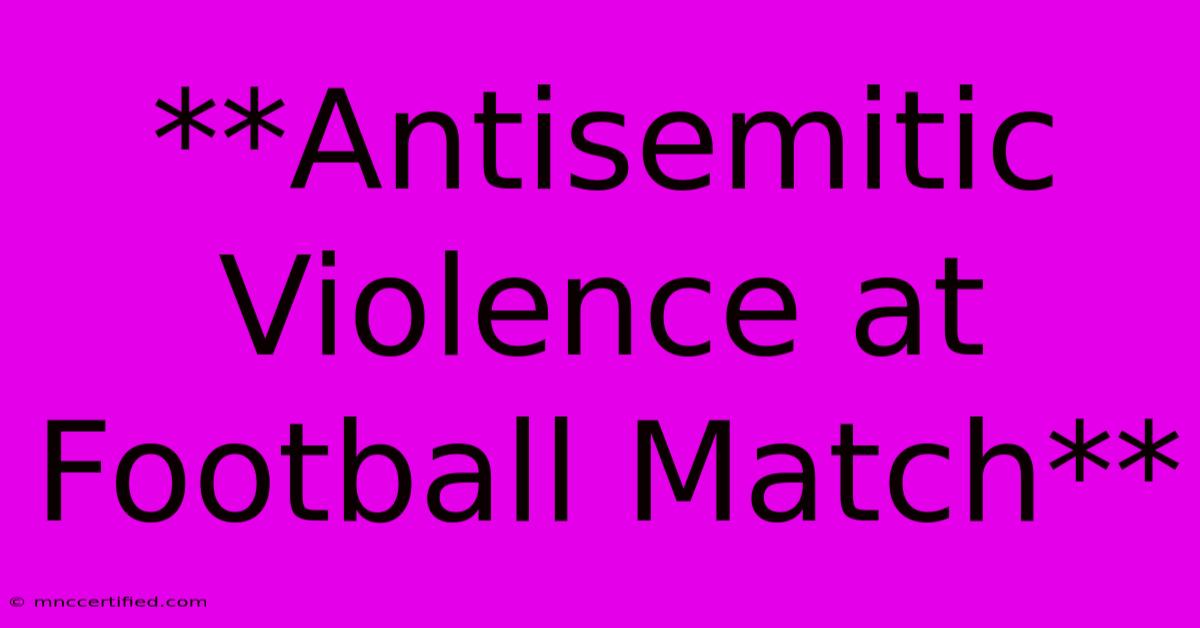**Antisemitic Violence At Football Match**

Table of Contents
Antisemitic Violence at Football Match: A Stain on the Sport We Love
The beautiful game, as football is often called, should be a place for passion, camaraderie, and sportsmanship. Sadly, this ideal is often marred by incidents of hate and intolerance, with antisemitism rearing its ugly head at football matches around the world. This is not just a problem for Jewish fans; it is a problem for all who believe in equality, respect, and the power of sport to unite.
A Recurring Problem:
Antisemitic chants, gestures, and even physical violence have become a disturbing trend in football stadiums. These acts of hate are not isolated incidents but rather a systemic issue that demands urgent attention. From the sadly familiar sight of Nazi salutes to the use of antisemitic slurs and discriminatory banners, these displays of bigotry taint the spirit of the game and threaten to alienate fans and players alike.
Examples of antisemitic violence:
- England vs. Hungary (September 2022): Hungarian fans targeted England players with antisemitic chants, leading to a UEFA investigation.
- Germany vs. Israel (2008): A friendly match was marred by a series of antisemitic incidents, including the display of Nazi flags and the throwing of objects at Israeli players.
- Numerous other incidents: Antisemitic incidents have been reported in countries like Spain, France, Italy, and the Netherlands, highlighting the global nature of the issue.
Why are Football Matches a Target?
Football matches provide a platform for large crowds to gather, creating a heightened sense of community and collective identity. This, unfortunately, can also be exploited by individuals and groups seeking to spread hate and discrimination. The anonymity of being part of a large crowd can embolden some to express bigotry that they might not otherwise feel comfortable expressing.
The Impact of Antisemitism in Football
Beyond the moral outrage:
- Damage to reputation: These incidents damage the reputation of the sport and its governing bodies, leading to negative publicity and sanctions.
- Deterrent to participation: Jewish fans and players may feel unwelcome and unsafe, discouraging them from attending matches or participating in the sport.
- Perpetuation of prejudice: Antisemitic incidents reinforce negative stereotypes and contribute to a climate of intolerance and prejudice.
Combating Antisemitism in Football: A Collective Responsibility
Addressing this problem requires a multi-pronged approach, involving fans, clubs, governing bodies, and governments:
1. Zero Tolerance Policy:
- Clubs and governing bodies must adopt a zero-tolerance policy towards antisemitism and implement strict sanctions, including bans and fines, for perpetrators.
- This needs to be more than just rhetoric; it requires consistent and decisive action against all forms of antisemitism.
2. Education and Awareness:
- Educational campaigns targeted at fans, players, and staff can help raise awareness about the history of antisemitism and its impact.
- Encouraging dialogue and fostering understanding between different communities is crucial to building a more inclusive and tolerant football culture.
3. Strong Law Enforcement:
- Law enforcement agencies must take swift and decisive action to prosecute perpetrators of antisemitic violence and hate speech.
- Robust security measures at matches and effective monitoring of online platforms can help prevent and deter future incidents.
4. Fan Empowerment:
- Fans themselves can play a crucial role by actively challenging antisemitic behavior and reporting incidents to club authorities.
- They can also support initiatives promoting inclusion and tolerance within the sport.
A Call for Action:
Antisemitic violence at football matches is a stain on the sport we love. It is a reminder of the work that remains to be done in combating hatred and discrimination. By taking collective action, we can create a football environment that is welcoming, inclusive, and free from prejudice. It's time to stand up against bigotry and ensure that the beautiful game truly lives up to its name.

Thank you for visiting our website wich cover about **Antisemitic Violence At Football Match** . We hope the information provided has been useful to you. Feel free to contact us if you have any questions or need further assistance. See you next time and dont miss to bookmark.
Featured Posts
-
Craigs Indifference To Next James Bond Casting
Nov 08, 2024
-
When Does Travel Insurance Start And End
Nov 08, 2024
-
John Bishop More 25 Tour Dates Available
Nov 08, 2024
-
Wiles The Strategist Behind Trumps Florida Victory
Nov 08, 2024
-
National Family Assurance Life Insurance
Nov 08, 2024